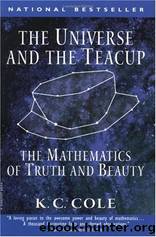The Universe And The Teacup by K.C. Cole

Author:K.C. Cole [Cole, K.C.]
Language: eng
Format: epub
Tags: Science, Maths
Publisher: Houghton Mifflin Harcourt
Published: 0101-01-01T00:00:00+00:00
Caltech scientists have taken yet another approach to fairness, based on the age-old idea of auctions. Auctions, Ledyard says, counteract a personâs ânatural tendency to ask for more than you really need.â An auction discourages people from bidding on what they donât need, because they have to pay for and take whatever they bid onâleaving them with less money for something else. In other words, they have to make choices that carry real consequences.
Of course, for an auction to be fair, everyone has to have an equal start. But not everyone agrees on what âequal startâ means. For example, Caltech got involved in helping divide up responsibility for L.A.âs polluted skies. The method they came up with works like an auction, except what players bid on is license to pollute. Cutting pollution is more difficult and expensive for some companies than for others. So the Clean Air Act of 1990 allowed California companies to buy and sell licenses to polluteâpermitting firms that invest in expensive technology to recoup their expenses by selling unneeded pollution allowances to others.
In order to make the process fair, however, the total amount of pollution permitted had to be fairly divided to start with. âIn this case, equal is not fair,â says Ledyard. âItâs not fair to give the same allowance to Joeâs Bar and Grill as to SoCal Edison.â
Instead, the allowances granted by the air quality board are based on levels of pollution during the years 1989â1990. Based on those figures, a factory might receive a permit to spew out three thousand pounds of pollution per year; a donut shop might receive an allowance of fifty pounds. But as Caltech economist Colin Camerer points out, that system ârewards people for polluting in the past.â
The system, in other words, is not perfect. But at least itâs a start at inventing a method that gives incentives to everyone to keep pollution downâand save money in the process.
Further complicating attempts to divide things fairly is the human factor. The NSF grant to Caltech was designated mainly for experimental testing to determine how well real peopleâs behavior matches the mathematical models.
Researchers have assumed, for example, that people would always act in a way that would maximize their gain. However, Caltechâs Camerer has found in a series of experiments that good manners can get in the way of rational behaviorâespecially if players were not strangers. Theyâll give up tangible rewards, even cold, hard cash, in order to avoid appearing greedy or selfish. People further alter their economic behavior when they are in personal contact. For example, people voluntarily contribute to communal goods such as streetlights and holiday parties. âBut if they are face-to-face, the rate of contribution goes way up,â says Ledyard. âWhy is an open question.â
Finally, the choices people make in one-to-one situations can be quite different from the choices they might make as a member of a larger group or community: for example, in a situation where a community is trying to decide whether a tax break is fair compensation for having a chemical factory or hazardous waste dump in its backyard.
Download
This site does not store any files on its server. We only index and link to content provided by other sites. Please contact the content providers to delete copyright contents if any and email us, we'll remove relevant links or contents immediately.
| Applied | Geometry & Topology |
| History | Infinity |
| Mathematical Analysis | Matrices |
| Number Systems | Popular & Elementary |
| Pure Mathematics | Reference |
| Research | Study & Teaching |
| Transformations | Trigonometry |
Modelling of Convective Heat and Mass Transfer in Rotating Flows by Igor V. Shevchuk(6434)
Weapons of Math Destruction by Cathy O'Neil(6267)
Factfulness: Ten Reasons We're Wrong About the World – and Why Things Are Better Than You Think by Hans Rosling(4737)
A Mind For Numbers: How to Excel at Math and Science (Even If You Flunked Algebra) by Barbara Oakley(3302)
Descartes' Error by Antonio Damasio(3272)
Factfulness_Ten Reasons We're Wrong About the World_and Why Things Are Better Than You Think by Hans Rosling(3235)
TCP IP by Todd Lammle(3180)
Fooled by Randomness: The Hidden Role of Chance in Life and in the Markets by Nassim Nicholas Taleb(3112)
Applied Predictive Modeling by Max Kuhn & Kjell Johnson(3067)
The Tyranny of Metrics by Jerry Z. Muller(3067)
The Book of Numbers by Peter Bentley(2966)
The Great Unknown by Marcus du Sautoy(2691)
Once Upon an Algorithm by Martin Erwig(2644)
Easy Algebra Step-by-Step by Sandra Luna McCune(2629)
Lady Luck by Kristen Ashley(2577)
Practical Guide To Principal Component Methods in R (Multivariate Analysis Book 2) by Alboukadel Kassambara(2541)
Police Exams Prep 2018-2019 by Kaplan Test Prep(2540)
All Things Reconsidered by Bill Thompson III(2389)
Linear Time-Invariant Systems, Behaviors and Modules by Ulrich Oberst & Martin Scheicher & Ingrid Scheicher(2364)
